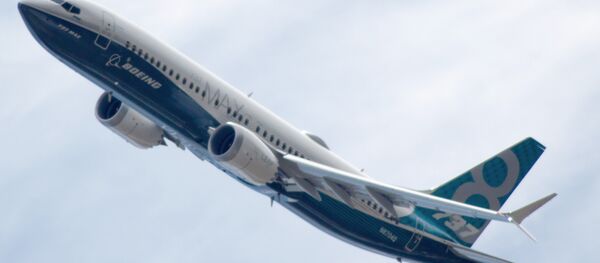https://sputnikglobe.com/20190515/boeing-no-orders-jets-1075021499.html
Boeing Received No New Orders for Aircraft in April - Reports
Boeing Received No New Orders for Aircraft in April - Reports
Sputnik International
MOSCOW (Sputnik) - US aerospace firm Boeing did not receive any new orders for aircraft in April, a month after one of its 737 MAX planes was involved in a... 15.05.2019, Sputnik International
2019-05-15T09:17+0000
2019-05-15T09:17+0000
2022-10-19T20:53+0000
https://cdn1.img.sputnikglobe.com/img/106833/43/1068334394_485:0:2661:1224_1920x0_80_0_0_719d2d4ff2c92d6e63455957f2fe221b.jpg
Sputnik International
feedback@sputniknews.com
+74956456601
MIA „Rossiya Segodnya“
2019
Sputnik International
feedback@sputniknews.com
+74956456601
MIA „Rossiya Segodnya“
News
en_EN
Sputnik International
feedback@sputniknews.com
+74956456601
MIA „Rossiya Segodnya“
Sputnik International
feedback@sputniknews.com
+74956456601
MIA „Rossiya Segodnya“
business, newsfeed, boeing, the boeing co, boeing 737
business, newsfeed, boeing, the boeing co, boeing 737
Boeing Received No New Orders for Aircraft in April - Reports
09:17 GMT 15.05.2019 (Updated: 20:53 GMT 19.10.2022) MOSCOW (Sputnik) - US aerospace firm Boeing did not receive any new orders for aircraft in April, a month after one of its 737 MAX planes was involved in a deadly crash in Ethiopia that resulted in the immediate grounding of this model by aviation authorities and carriers around the world, CNN reported, citing a company report.
CNN has reported that the 737 MAX was not the only model affected — the 787 Dreamliner and the 777 also did not attract new buyers. The broadcaster noted that although Boeing did receive some orders in late March, the company reported only bookkeeping entries the following month that were not considered orders.
READ MORE: Warren Buffett Claims Not Afraid to Fly on Boeing 737 MAX Despite Deadly Crashes
Since other types of Boeing aircraft did not have any safety problems, the lack of orders could be explained by the fact that airlines were waiting for Boeing to lower prices following the 737 MAX incident, the broadcaster added, citing an analyst from Standard & Poor's.
Two Boeing 737 MAX aircraft crashed within six months of each other — the first in Indonesia in October 2018 and the second in Ethiopia in March. The second tragedy led to world aviation authorities and carriers either grounding all 737 MAX series aircraft or closing their aerospace to them.
According to investigators, the pilots on the Ethiopian Airlines jet needed more than four minutes to realise that incorrect information from sensor systems had made MCAS push the jet's nose down in a situation when there was no need for that, causing the fatal accident.


